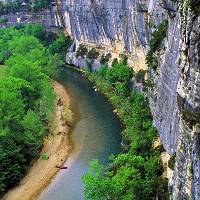Arkansas Water Quality Policy

Arkansas, the Natural State, is often portrayed as a state with abundant water resources. However, the state has its share of polluted waterways, diminished aquifer levels and water access concerns.
The Division of Agriculture's Public Policy Center promotes the understanding of federal and state water policy issues through research, community outreach and public education.
What is Water Quality?
The term "water quality" can mean different things to different people. The most widely used definition is that water quality is "the chemical, physical and biological characteristics of water, usually in respect to its suitability for a designated use."
Water has many uses, such as for recreation, drinking, fisheries, agriculture and
industry. Each of these uses have been assigned chemical, physical and biological
standards necessary to support the use. For example, standards are higher for drinking
water than agriculture or industry use.
Current Water Issues
Arkansas Water Plan Update
Arkansas' water plan, a document that guides state policy on water conservation, development and protection, was updated in December 2014 after more than a year of public meetings and review overseen by the Arkansas Natural Resources Commission.
On Aug. 21, 2023, Gov. Sarah Sanders signed a proclamation calling on the Arkansas Department of Agriculture to update to the state water plan.
The update will take place in two phases, with the first being a review of existing information and new analyses of water availability in Arkansas. In addition to meetings assessing public opinion about water needs, the first phase will include recommendations for water management strategies for all water users and funding mechanisms.
2014 Arkansas Water Plan information.
Nonpoint Source Pollution Management Plan
Excessive sediment, nutrients and toxic metals prevent many Arkansas waterways from supporting aquatic life or other intended uses. For more than two decades, Arkansans have helped shape the state's Nonpoint Source Pollution Management Plan, a guiding document that includes agency resources, landowner best practices, and specific information about priority watersheds in the state.
The 2024-2029 NPS Management Plan is now available at https://agriculture.arkansas.gov/natural-resources/water-management/nonpoint-source-management, and includes new priority watersheds identified for funding and education opportunities.
Previously, the Public Policy Center partnered with the Arkansas Natural Resources Commission to produce the 2018-2023 Nonpoint Source Pollution Management Plan, which discusses threats to 11 priority watersheds and action steps that watershed groups or industries can take to reduce pollution levels.
Historical Documents
Arkansas Nonpoint Source Pollution Management Plan (2018-2023)
Arkansas Nonpoint Source Pollution Management Plan (2011-2016)
The Role of Nonpoint Source Models in Watershed Management
Watershed Prioritization for Managing Nonpoint Source Pollution in Arkansas
2020 Arkansas Natural Resources Commission Annual Report for the NPS Program
Arkansas Nutrient Reduction Strategy
The recently renamed Arkansas Natural Resources Division completed an update to the state's nutrient reduction strategy, releasing a fact sheet along with the plan in 2022 that uses tiers of watershed to identify areas that need a greater focus for nutrient reduction.
Find the plan, a map showing watersheds by tier, and public comments made during the recent draft process at https://www.agriculture.arkansas.gov/natural-resources/divisions/water-management/arkansas-nutrient-reduction-strategy/.
Arkansas' Impaired Waterbodies
Every two years, the Arkansas Department of Environmental Quality creates a list of rivers and lakes that have been tested and found to not meet water quality standards for their intended use (i.e., not enough oxygen to support fish life). This list, known as the 303(d) list, is submitted to the Environmental Protection Agency. The information gives state and federal agencies, as well as interested residents, a better understanding of the health of Arkansas' waterways and also a way to measure the impact of water quality activities and projects.